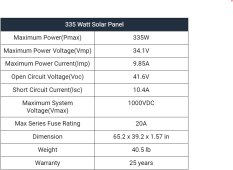I am relatively new to the solar world and thus the beginner category.
In late November I purchased a kit with two EcoFlow Delta Pro's, 8 Rich 335W panels, Double Voltage Hub and all the associated accessories, including two sets of 50' cables. Given the 150V and 15A limitations of the Delta Pros I plan to configure the panels with two sets of two in series which feed a parallel adapter for each Delta Pro. Since purchasing I have performed a fair amount of testing and am close mounting the panels. There will be two mount locations. One about 100' from the house and the second about 85' from the house.
Most calculators indicate that I should use 8AWG cable, but I tested by combining the included two 50' sets of 10AWG cables for a100' run and the voltage drop was less than 1% (77.4V vs 78V). Therefore I don't see a reason to upgrade to 8 AWG cable. I will use both sets included with the kit for one run to the house and am looking to buy a second a set cables for the second run.
The included cables are 50' of Slocable H1Z2Z2-K 1x6.0mm2. This is tinned copper.
Given that many components of the kit were made in China, I would like to purchase the cable for the second run from a USA manufacturer. A small concession I know. After some searching I discovered that TEMCO has a similar product for a very good price, relatively speaking.
TEMCo 10 AWG Solar Panel Wire
There are of course some differences:
Thank you!
In late November I purchased a kit with two EcoFlow Delta Pro's, 8 Rich 335W panels, Double Voltage Hub and all the associated accessories, including two sets of 50' cables. Given the 150V and 15A limitations of the Delta Pros I plan to configure the panels with two sets of two in series which feed a parallel adapter for each Delta Pro. Since purchasing I have performed a fair amount of testing and am close mounting the panels. There will be two mount locations. One about 100' from the house and the second about 85' from the house.
Most calculators indicate that I should use 8AWG cable, but I tested by combining the included two 50' sets of 10AWG cables for a100' run and the voltage drop was less than 1% (77.4V vs 78V). Therefore I don't see a reason to upgrade to 8 AWG cable. I will use both sets included with the kit for one run to the house and am looking to buy a second a set cables for the second run.
The included cables are 50' of Slocable H1Z2Z2-K 1x6.0mm2. This is tinned copper.
Given that many components of the kit were made in China, I would like to purchase the cable for the second run from a USA manufacturer. A small concession I know. After some searching I discovered that TEMCO has a similar product for a very good price, relatively speaking.
TEMCo 10 AWG Solar Panel Wire
There are of course some differences:
- The Slocable wire is tinned copper where the TEMCo is bare copper.
- I believe the Slocable wire had more strands, but I can't confirm how many. TEMCo appears to have 19 strands.
- Slocable rated at 1000V and manufacturer says 70A but vendor says 40A. TEMCo is rated at 600V and 40A.
- There are differences in insulation as well, but I plan to run in conduit
- Other differences on which I'm getting up to speed
- Given the distance and the differences listed above is there any reason to believe that the TEMCo wire will perform significantly different than the Slocable?
- Does tinned copper make a significant difference?
- Any other factors to consider?
Thank you!




